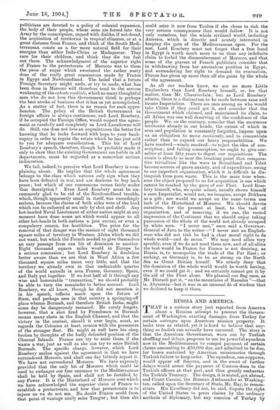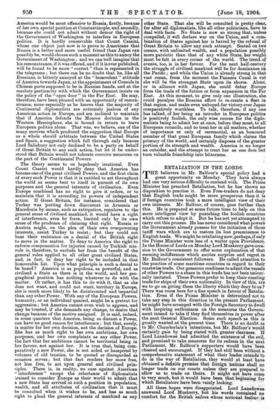T HAT is a curious story just reported from America about
a Russian attempt to prevent the Govern- ment of Washington exacting damages from Turkey for certain outrages upon American mission property. It looks true as related, yet it is hard to believe that any- thing so foolish can actually have occurred. The story is that the American Government, worn out by Turkish shuffling and delays, proposes to use its powerful squadron now in the Mediterranean to compel payment of certain claims amounting to .X50,000 due, and admitted to be due, for losses sustained by American missionaries through Turkish failure to keep order. The squadron, one supposes, would appear off Smyrna, and in the event of further delays would arrest the payment of Custom-dues to the Turkish officers at that port, and thus greatly embarras1 the Turkish Treasury. The design, it is stated, got abroad, and Count Ca.ssini, the Russian Ambassador at Washing- ton, called upon the Secretary of State, Mr. Hay, to remon- strate. His Excellency did not, he said, dispute the right of the United States to press claims by the ordinary methods of diplomacy, but any coercion of Turkey by America would be most offensive to Russia, firstly, because of her own special position at Constantinople, and secondly, because she could not admit without demur the right of the Government of Washington to interfere in European politics. It is hardly conceivable that Count Cassini, whose one object just now is to prove to Americans that Russia is a better and more useful friend than Japan can possibly be, would choose such a moment as this to annoy the Government of Washington ; and we can well imagine that his remonstrance, if it was offered, and if it is ever published, will be found to be more " correct " than is represented in the telegrams ; but there can be no doubt that he, like all Russians, is bitterly annoyed at the " benevolent " attitude of America towards Japan, at the appointment of Consuls in Chinese ports supposed to be in Russian hands, and at the resolute pertinacity with which the Government insists on the policy of the "open door" in the Far East. He may, therefore, have been pleased with an opportunity of remon- strance, more especially as he knows that the majority of Continental diplomatists are extremely jealous of any American action in Europe, and are inclined to maintain that if America defends the Monroe doctrine in the Western Hemisphere, she is bound in return to leave European politics alone. That was, we believe, one of the many motives which produced the suggestion that Europe as a whole should arbitrate between the United States and Spain, a suggestion which fell through only because Lord Salisbury not only declined to be a party on behalf of Great Britain to any such action, but let it be under- stood that Britain would not tolerate coercive measures on the part of the Continental Powers.
The theory seems to us hopelessly irrational. Even Count Cassini would hardly deny that America has become one of the great civilised Powers, and the first claim of every such Power is that it is entitled to act throughout the world as seems best to itself in pursuit of its own purposes and the general interests of civilisation. Even Europe combined has no right to give it orders, Or to maintain that it is exceeding its powers of independent action. If Great Britain, for instance, considered that Turkey was putting down discontent in Armenia or Macedonia by means, such as extirpation, repulsive to the general sense of civilised mankind, it would have a right of interference, even by force, limited only by its own sense of the prudence of claiming that right. Russia or Austria might, on the plea of their own overpowering interests, assist Turkey to resist ; but they could not base their resistance on a denial of the British right to move in the matter. To deny to America the right to enforce compensation for injuries caused by Turkish mis- rule is, therefore, to exclude her from the benefit of the general rules applied. to all other great civilised States, and, in fact, to deny her right to be included in that honourable list. Upon what principle is such a denial to be based ? America is as populous, as powerful, and as civilised a State as there is in the world, and her geo- graphical position has nothing whatever to do with the matter. Or rather, it has this to do with it, that as she does not want, and could not want, territory in Europe, she is much more likely to be disinterested and impartial than any other Power. With any of the European Powers, humanity, or an individual quarrel, might be a pretext for aggression ; but America cannot even wish to aggress, and may be trusted, if she demands any change, to desire that change because of the motive assigned. It is said, indeed, in some quarters that America, being so distant a Power, can have no good reason for interference ; but that, surely, is matter for her own decision, not the decision of Europe. She has as much right to her own ambitions, her own purposes, and her own complaints as any other Power, the fact that her ambitions cannot be territorial being in her favour, not against her. It is true that, being com- paratively a new Power, she is not aided or hampered by volumes of old treaties, to be quoted or disregarded as occasion serves ; but that fact renders her more free, not less free, to act upon general and civilised prin- ciples. There is, in reality, no case against American " interference " except the reluctance of diplomatists :rained to consider Europe as their world to admit that new State has arrived at such a position in population, xealth, and all attributes of civilisation that it must be consulted when it wishes to be, and has as much right to plead the general interests of mankind as any other State. That she will be consulted is pretty clear, for after all diplomatists, like all other politicians, have to deal with facts. No State is now so strong that, unless compelled, it will declare war on the Union, and a com, bination of States against her is barred by the refusal of Great Britain to allow any such attempt. Seated on two oceans, with unlimited wealth, and a population possibly more patriotic than that of any white State, her weight must be felt in every corner of the world. The trend a events, too, is in her favour. For the next half-century the struggle of civilised mankind will be for dominance cia the Pacific ; and while the Union is already strong in that vast ocean, from the moment the Panama Canal is cut she will be the strongest State upon its shores. Alone, or in alliance with Japan, she could. debar Europe from the trade of the future or from expansion in the Far East. At this moment, to give only one illustration, she could paralyse the Russian effort to re-create a fleet in that region, and make even unhoped-for victory over Japan comparatively worthless. To talk, therefore, if any one has talked, of her being an intruder in European politics is positively foolish, the only wise course for the diplo- matists being to admit her at once, before they must, to all European councils, and to treat her in all matters, whether of importance or only of ceremonial, as an honoured member of that great European family which claims the primacy of the world, and certainly disposes of the greater portion of its strength and wealth. America is no longer an outsider, and the attempt to treat her as one does but turn valuable friendship into bitterness.







































 Previous page
Previous page